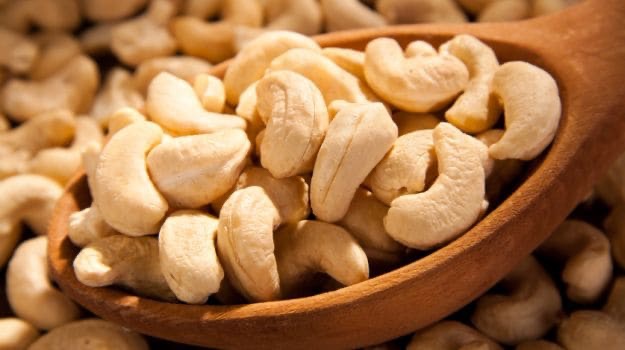
By Prof. Raphael Nyarkotey Obu
Cashews are kidney-shaped seeds sourced from the cashew tree — a tropical tree native to Brazil but now cultivated in various warm climates across the world.
Healthline advises that aw cashews are not safe to eat, as they contain a substance known as urushiol, found in poison ivy. Urushiol is toxic, and contact with it can trigger a skin reaction in some people.
Cashew kernels are cooked in processing to remove this toxic liquid, and this resulting product is sold as “raw”.
In this article, I explore the science behind cashew nuts.
Cashew, Science
Rich in nutrients
US Department of Agriculture reports revealed that one ounce (28 grams) of unroasted, unsalted cashews has the following:
• Calories: 157
• Protein: 5 grams
• Fat: 12 grams
• Carbs: 9 grams
• Fiber: 1 gram
• Copper: 69% of the Daily Value (DV)
• Magnesium: 20% of the DV
• Manganese: 20% of the DV
• Zinc: 15% of the DV
• Phosphorus: 13% of the DV
• Iron: 11% of the DV
• Selenium: 10% of the DV
• Thiamine: 10% of the DV
• Vitamin K: 8% of the DV
• Vitamin B6: 7% of the DV
Some studies( Clifton et al. 2017; Zong et al. 2018; Zhuang et al. 2019) found that unsaturated fats are of high quality in cashews. These fats have been linked to a lower risk of premature death and heart disease.
Other studies(Gonçalves et al. 2023; US Department of Agriculture, 2019) also found that cashews have low sugar, are a source of fiber, and contain almost the same amount of protein in cooked meat.
Cashews have a good amount of copper, a mineral essential for energy production, healthy brain development, and a strong immune system. One can also see that they have a good amount of magnesium and manganese, nutrients important for bone health.
Plant compounds
One study by Bolling et al.(2011) found that Cashews are a rich source of polyphenols and carotenoids — two classes of antioxidants also found in other tree nuts.
Some studies(Luo et al. 2023; Bi et al. 2016; Guarneiri et al. 2021) have linked antioxidants in nuts like walnuts, pecans, and almonds to lower levels of oxidative cell damage.
On the other hand, one study by Chandrasekara and Shahidi(2011) found that roasted cashews have more antioxidant activity compared with their “raw” counterparts.
lose weight
some studies(Freisling et al. 2018; Wang et al. 2021) found that nut-rich diets help to lose weight and overall lower body weight than nut-free diets.
According to the FoodData Central database of the United States Department of Agriculture (USDA), cashews provide 157 calories per 1-ounce (28-gram) serving.
Baer and Novotny(2018) found that the human body coulddigest and absorb around 84% of these calories. This is likely because a portion of the fat they contain remains trapped within the cashew’s fibrous wall rather than being absorbed during digestion.
Besides, studies explained that(Gebauer et al. 2016; Baer and Novotny. 2018) roasting or grinding nuts could enhance thebody’s ability to fully digest them, thereby increasing the number of calories absorbed.
Due to this, weight loss benefits may be strongest for whole, “raw” cashews, although more research is needed to confirm this. And you may be sacrificing the antioxidant benefit that comes with roasting cashews.
Other studies( Hervik and Svihus, 2019; Clark and Slavin. 2013; Dhillon et al. 2016) also found that nuts are rich in protein and fiber, known to decrease hunger and promote feelings of fullness, both of which can further promote weight loss.
Heart Health
Some studies(Guasch-Ferré et al. 2017; Aune et al. 2016; Liu et al. 2019) found that diets rich in nuts, such as cashews, are linked to a lower risk of disease, such as stroke and heart disease.
Darvish Damavandi et al.(2019) study found that those with type 2 diabetes who consumed 10% of their daily calories from cashews had lower LDL (bad) cholesterol to HDL (good) cholesterol ratios than those who ate no cashews at all.
A previous study by Kunutsor et al. (2017) found that a low LDL to HDL ratio is normally considered a marker of good heart health.
Two other studies( Mohan et al. 2018; Mah et al. 2017) also linked cashew nut consumption to higher HDL cholesterol levels and lower blood pressure, as well as lowering total and LDL cholesterol levels.
This notwithstanding, one review by Mahboobi S(2019) found mixed results. This systematic review of five studies found that regular intake of cashews could lower blood pressure and triglyceride levels. However, it finds no effect on total, LDL, or HDL cholesterol levels.
Another review( Morvaridzadeh et al. 2020) also did not find any significant changes in cholesterol or triglyceride levels afterthe consumption of 1–3.8 ounces (28–108 grams) of cashews per day for 4–12 weeks.
Type 2 diabetes
Some studies( McRae MP. 2018; Weickert and Pfeiffer, 2018) found that cashews are a good source of fiber, a nutrient that helps prevent blood sugar spikes, and is believed to offer protection against type 2 diabetes.
A study (Darvish Damavandi R et al. 2019) found that people with type 2 diabetes who ate 10% of their daily calories from cashews had lower insulin levels — a marker of blood sugar control — than those who ate no cashews at all.
Moreover, cashews only contain 8 grams of net carbs per portion, of which less than 2 grams come from sugars.
warnings
Chandrasekara and Shahidi( 2011) study found that roasted cashews could contain higher levels of health-promoting antioxidants than unroasted cashews. Hence, it is advisable to roast cashews at home without extra oils.
To do so, simply spread your unroasted cashews in one layer on a baking tray. Then, dry roast them at 350°F (188°C) on the middle rack of your oven for 8–15 minutes. Remember to stir the cashews in 3–5-minute intervals to avoid burning.
Alternatively, toss your cashews in a skillet over medium heat for 3–5 minutes, or until the cashews become slightly brown.
Healthline explained that soaking phytate-rich foods like grains and legumes overnight can help reduce phytate content and improve digestibility, there is no evidence to support this practice with nuts.
Kumari et al.(2020) study found that soaking nuts had no significant effect on phytate levels and lowered the mineral content of the nuts.
A previous study by Taylor et al.(2018) also debunked the claim that soaking nuts can improve digestibility or gastrointestinal tolerance.
Finally, cashews are classified as tree nuts. Therefore, people allergic to tree nuts, such as almonds, Brazil nuts, pecans, pistachios, walnuts, or hazelnuts, may have a higher risk of also being allergic to cashews.
Take Home
Cashews are rich in fiber, protein, and healthy fats. They also contain a variety of vitamins, minerals, and health-protective beneficial plant compounds. Same as nuts, cashews couldpromote weight loss, blood sugar control, and heart health.
NB:
Prof. Nyarkotey has strict sourcing guidelines and relies on peer-reviewed studies, academic research institutions, and medical associations to justify his write-ups. My articles are for educational purposes and do not serve as Medical advice for Treatment. I aim to educate the public about evidence-based scientific Naturopathic Therapies.
The writer is a Professor of Naturopathic Healthcare, a Medical Journalist, and a science writer. President, NyarkoteyUniversity College of Holistic Medicine & Technology (NUCHMT)/African Naturopathic Foundation, Ashaiman, Ghana. E. mail: professor40naturopathy@gmail.com. Visit-profnyarkotey.com for more.
Nyarkotey Herbal Mall has been set up to house quality natural products from all over the world. You can now buy all your vitamins, herbs, supplements, homeopathy drugs, Ayurveda drugs and more. It is located at Amrahia, DodowaRoad, behind Potbelly. We have qualified Naturopathic doctors managing the Natural Medicine Mall. We do deliveries as well. Call on: +233207844338/0541090045. Special consultation is also available for diabetics, hypertensive and cancer patients, and many more
References
1. Taylor H, Webster K, Gray AR, Tey SL, Chisholm A, Bailey K, Kumari S, Brown RC. The effects of ‘activating’ almonds on consumer acceptance and gastrointestinal tolerance. Eur J Nutr. 2018 Dec;57(8):2771-2783. doi: 10.1007/s00394-017-1543-7. Epub 2017 Sep 27. PMID: 28956139.
2. Hervik AK, Svihus B. The Role of Fiber in Energy Balance. J Nutr Metab. 2019 Jan 21;2019:4983657. doi: 10.1155/2019/4983657. PMID: 30805214; PMCID: PMC6360548.
3. Dhillon J, Craig BA, Leidy HJ, Amankwaah AF, Osei-Boadi Anguah K, Jacobs A, Jones BL, Jones JB, Keeler CL, Keller CE, McCrory MA, Rivera RL, Slebodnik M, Mattes RD, Tucker RM. The Effects of Increased Protein Intake on Fullness: A Meta-Analysis and Its Limitations. J Acad Nutr Diet. 2016 Jun;116(6):968-83. doi: 10.1016/j.jand.2016.01.003. Epub 2016 Mar 3. PMID: 26947338.
4. Aune D, Keum N, Giovannucci E, Fadnes LT, Boffetta P, Greenwood DC, Tonstad S, Vatten LJ, Riboli E, Norat T. Nut consumption and risk of cardiovascular disease, total cancer, all-cause and cause-specific mortality: a systematic review and dose-response meta-analysis of prospective studies. BMC Med. 2016 Dec 5;14(1):207. doi: 10.1186/s12916-016-0730-3. PMID: 27916000; PMCID: PMC5137221.
5. Kunutsor SK, Zaccardi F, Karppi J, Kurl S, Laukkanen JA. Is High Serum LDL/HDL Cholesterol Ratio an Emerging Risk Factor for Sudden Cardiac Death? Findings from the KIHD Study. J Atheroscler Thromb. 2017 Jun 1;24(6):600-608. doi: 10.5551/jat.37184. Epub 2016 Oct 26. PMID: 27784848; PMCID: PMC5453685.
6. Mohan V, Gayathri R, Jaacks LM, Lakshmipriya N, AnjanaRM, Spiegelman D, Jeevan RG, Balasubramaniam KK, Shobana S, Jayanthan M, Gopinath V, Divya S, Kavitha V, Vijayalakshmi P, Bai R MR, Unnikrishnan R, Sudha V, Krishnaswamy K, Salas-Salvadó J, Willett WC. Cashew Nut Consumption Increases HDL Cholesterol and Reduces Systolic Blood Pressure in Asian Indians with Type 2 Diabetes: A 12-Week Randomized Controlled Trial. J Nutr. 2018 Jan 1;148(1):63-69. doi: 10.1093/jn/nxx001. PMID: 29378038.
7. Mah E, Schulz JA, Kaden VN, Lawless AL, Rotor J, Mantilla LB, Liska DJ. Cashew consumption reduces total and LDL cholesterol: a randomized, crossover, controlled-feeding trial. Am J Clin Nutr. 2017 May;105(5):1070-1078. doi: 10.3945/ajcn.116.150037. Epub 2017 Mar 29. PMID: 28356271.
8. McRae MP. Dietary Fiber Intake and Type 2 Diabetes Mellitus: An Umbrella Review of Meta-analyses. J ChiroprMed. 2018 Mar;17(1):44-53. doi: 10.1016/j.jcm.2017.11.002. Epub 2018 Mar 1. PMID: 29628808; PMCID: PMC5883628.
9. Chandrasekara N, Shahidi F. Effect of roasting on phenolic content and antioxidant activities of whole cashew nuts, kernels, and testa. J Agric Food Chem. 2011 May 11;59(9):5006-14. doi: 10.1021/jf2000772. Epub 2011 Mar 25. PMID: 21438525.
10. Kumari S, Gray AR, Webster K, Bailey K, Reid M, Kelvin KAH, Tey SL, Chisholm A, Brown RC. Does ‘activating’ nuts affect nutrient bioavailability? Food Chem. 2020 Jul 30;319:126529. doi: 10.1016/j.foodchem.2020.126529. Epub 2020 Feb 29. PMID: 32199146.
11. Darvish Damavandi R, Mousavi SN, Shidfar F, Mohammadi V, Rajab A, Hosseini S, Heshmati J. Effects of Daily Consumption of Cashews on Oxidative Stress and Atherogenic Indices in Patients with Type 2 Diabetes: A Randomized, Controlled-Feeding Trial. Int J EndocrinolMetab. 2019 Jan 23;17(1):e70744. doi: 10.5812/ijem.70744. PMID: 30881468; PMCID: PMC6408729.
12. Weickert MO, Pfeiffer AFH. Impact of Dietary Fiber Consumption on Insulin Resistance and the Prevention of Type 2 Diabetes. J Nutr. 2018 Jan 1;148(1):7-12. doi: 10.1093/jn/nxx008. PMID: 29378044.
13. Morvaridzadeh M, Sepidarkish M, Farsi F, Akbari A, Mostafai R, Omidi A, Potter E, Heshmati J. Effect of Cashew Nut on Lipid Profile: A Systematic Review and Meta-Analysis. Complement Med Res. 2020;27(5):348-356. English. doi: 10.1159/000506348. Epub 2020 Mar 11. PMID: 32160624.
14. Mahboobi S. The Effect of Cashew Nut on Cardiovascular Risk Factors and Blood Pressure: A Systematic Review and Meta-analysis (P06-117-19). Curr Dev Nutr. 2019 Jun 13;3(Suppl 1):nzz031.P06-117-19. doi: 10.1093/cdn/nzz031.P06-117-19. PMCID: PMC6573847.
15. Liu G, Guasch-Ferré M, Hu Y, Li Y, Hu FB, Rimm EB, Manson JE, Rexrode KM, Sun Q. Nut Consumption in Relation to Cardiovascular Disease Incidence and Mortality Among Patients With Diabetes Mellitus. Circ Res. 2019 Mar 15;124(6):920-929. doi: 10.1161/CIRCRESAHA.118.314316. PMID: 30776978; PMCID: PMC6417933.
16. Darvish Damavandi R, Mousavi SN, Shidfar F, Mohammadi V, Rajab A, Hosseini S, Heshmati J. Effects of Daily Consumption of Cashews on Oxidative Stress and Atherogenic Indices in Patients with Type 2 Diabetes: A Randomized, Controlled-Feeding Trial. Int J EndocrinolMetab. 2019 Jan 23;17(1):e70744. doi: 10.5812/ijem.70744. PMID: 30881468; PMCID: PMC6408729.
17. Clark MJ, Slavin JL. The effect of fiber on satiety and food intake: a systematic review. J Am Coll Nutr. 2013;32(3):200-11. doi: 10.1080/07315724.2013.791194. PMID: 23885994.
18. Guasch-Ferré M, Liu X, Malik VS, Sun Q, Willett WC, Manson JE, Rexrode KM, Li Y, Hu FB, Bhupathiraju SN. Nut Consumption and Risk of Cardiovascular Disease. J Am Coll Cardiol. 2017 Nov 14;70(20):2519-2532. doi: 10.1016/j.jacc.2017.09.035. PMID: 29145952; PMCID: PMC5762129.
19. Clifton PM, Keogh JB. A systematic review of the effect of dietary saturated and polyunsaturated fat on heart disease. Nutr Metab Cardiovasc Dis. 2017 Dec;27(12):1060-1080. doi: 10.1016/j.numecd.2017.10.010. Epub 2017 Oct 18. PMID: 29174025.
20. Zong G, Li Y, Sampson L, Dougherty LW, Willett WC, Wanders AJ, Alssema M, Zock PL, Hu FB, Sun Q. Monounsaturated fats from plant and animal sources in relation to risk of coronary heart disease among US men and women. Am J Clin Nutr. 2018 Mar 1;107(3):445-453. doi: 10.1093/ajcn/nqx004. PMID: 29566185; PMCID: PMC5875103.
21. Zhuang P, Zhang Y, He W, Chen X, Chen J, He L, Mao L, Wu F, Jiao J. Dietary Fats in Relation to Total and Cause-Specific Mortality in a Prospective Cohort of 521 120 Individuals With 16 Years of Follow-Up. Circ Res. 2019 Mar;124(5):757-768. doi: 10.1161/CIRCRESAHA.118.314038. PMID: 30636521.
22. Bolling BW, Chen CY, McKay DL, Blumberg JB. Tree nut phytochemicals: composition, antioxidant capacity, bioactivity, impact factors. A systematic review of almonds, Brazils, cashews, hazelnuts, macadamias, pecans, pine nuts, pistachios and walnuts. Nutr Res Rev. 2011 Dec;24(2):244-75. doi: 10.1017/S095442241100014X. Epub 2011 Dec 12. PMID: 22153059.
23. Luo B, Mohammad WT, Jalil AT, Saleh MM, Al-TaeeMM, Alshahrani MY, Mohammed NM, Heydani A. Effects of almond intake on oxidative stress parameters: A systematic review and meta-analysis of clinical trials. Complement Ther Med. 2023 May;73:102935. doi: 10.1016/j.ctim.2023.102935. Epub 2023 Feb 24. PMID: 36842635.
24. Bi D, Zhao Y, Jiang R, Wang Y, Tian Y, Chen X, Bai S, She G. Phytochemistry, Bioactivity and Potential Impact on Health of Juglans: the Original Plant of Walnut. Nat Prod Commun. 2016 Jun;11(6):869-80. PMID: 27534138.
25. Guarneiri LL, Paton CM, Cooper JA. Pecan-enriched diets decrease postprandial lipid peroxidation and increase total antioxidant capacity in adults at-risk for cardiovascular disease. Nutr Res. 2021 Sep;93:69-78. doi: 10.1016/j.nutres.2021.07.004. Epub 2021 Jul 23. PMID: 34428717.
26. Chandrasekara N, Shahidi F. Effect of roasting on phenolic content and antioxidant activities of whole cashew nuts, kernels, and testa. J Agric Food Chem. 2011 May 11;59(9):5006-14. doi: 10.1021/jf2000772. Epub 2011 Mar 25. PMID: 21438525.
27. Freisling H, Noh H, Slimani N, Chajès V, May AM, Peeters PH, Weiderpass E, Cross AJ, Skeie G, Jenab M, Mancini FR, Boutron-Ruault MC, Fagherazzi G, KatzkeVA, Kühn T, Steffen A, Boeing H, Tjønneland A, Kyrø C, Hansen CP, Overvad K, Duell EJ, Redondo-Sánchez D, Amiano P, Navarro C, Barricarte A, Perez-Cornago A, Tsilidis KK, Aune D, Ward H, Trichopoulou A, Naska A, Orfanos P, Masala G, Agnoli C, Berrino F, Tumino R, Sacerdote C, Mattiello A, Bueno-de-Mesquita HB, Ericson U, Sonestedt E, Winkvist A, Braaten T, Romieu I, Sabaté J. Nut intake and 5-year changes in body weight and obesity risk in adults: results from the EPIC-PANACEA study. EurJ Nutr. 2018 Oct;57(7):2399-2408. doi: 10.1007/s00394-017-1513-0. Epub 2017 Jul 21. PMID: 28733927.
28. Wang J, Wang S, Henning SM, Qin T, Pan Y, Yang J, Huang J, Tseng CH, Heber D, Li Z. Mixed Tree Nut Snacks Compared to Refined Carbohydrate Snacks Resulted in Weight Loss and Increased Satiety during Both Weight Loss and Weight Maintenance: A 24-Week Randomized Controlled Trial. Nutrients. 2021 Apr 30;13(5):1512. doi: 10.3390/nu13051512. PMID: 33946212; PMCID: PMC8145615.
29. Baer DJ, Novotny JA. Metabolizable Energy from Cashew Nuts is Less than that Predicted by Atwater Factors. Nutrients. 2018 Dec 24;11(1):33. doi: 10.3390/nu11010033. PMID: 30586843; PMCID: PMC6356908.
30. Gebauer SK, Novotny JA, Bornhorst GM, Baer DJ. Food processing and structure impact the metabolizable energy of almonds. Food Funct. 2016 Oct 12;7(10):4231-4238. doi: 10.1039/c6fo01076h. PMID: 27713968.
31. Gonçalves B, Pinto T, Aires A, Morais MC, Bacelar E, Anjos R, Ferreira-Cardoso J, Oliveira I, Vilela A, Cosme F. Composition of Nuts and Their Potential Health Benefits-An Overview. Foods. 2023 Feb 23;12(5):942. doi: 10.3390/foods12050942. PMID: 36900459; PMCID: PMC10000569.




